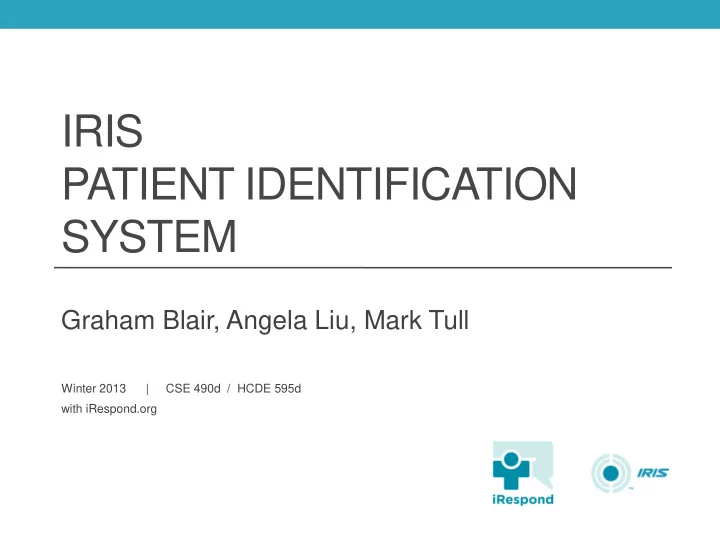

IRIS PATIENT IDENTIFICATION SYSTEM Graham Blair, Angela Liu, Mark Tull Winter 2013 | CSE 490d / HCDE 595d with iRespond.org
Problem
2 Part Problem 1. Identification of patients in developing world is very difficult. 2. Medical Records in developing world are poor or non-existent and difficult to access/use.
Patient Identification • Very difficult in developing countries • Lack of infrastructure • Lack of national accounting/tracking of citizenry (eg, USA SSN) • Lack of photo ID cards • means of authenticating cards… • Linguo-Cultural hurdles • Maybe not enough names in language/dialect to accommodate entire population
Medical Records • Often little or no records kept in developing world • (logistical issues) • If records are kept, often of little use • Social Constraints • Similar to ID problems • (No national ID system, no photos, language, etc.) • Additionally: • Security/privacy concerns can cause poor record-keeping
Medical Records (cont.) • Paper medical records may be of low value • Nomadic populations, mobile providers • Electronic Medical Records (EMRs) may be of low value (or not used) because • Access problems • poor connectivity (eg, rural areas) • Hardware/Software problems • no hardware • power problems • language input issues (keyboard, software language support)
How is identification done now? • Frequently, by recruiting locals to help ID people • Translators • Tribal/village elders, etc. • “Connectors” (to use Malcolm Gladwell’s term) • Unfortunately • Expensive / Difficult / Not always available • …It’s done as best it can be per situation • Sadly, the results are often unsatisfactory
Who needs this? Who will it affect? • Healthcare Workers and Researchers in Developing World • Providers, Researchers • Analysts / Policymakers • BONUS: in developed world • Funders • Governments, NGOs
Solution
| IRIS Biometric Patient ID and EMR system Retrieve Record Access Scan ID EMR Create Record
Project Description Major Components • Device • Smartphone, etc. • Fingerprint scanner • or other biometric • Database • Cloud-based, primarily • Local: temporary, caching, etc. • Remote: (sometimes)
Project Description Stakeholders • iRespond • IRIS • preliminary testing of some elements • other systems • Thailand • Ministry of Public Health • Two universities participating
Design Challenges • Device Agnostic • Browser-based • Language Agnostic • Input only numerals (outside EMR) • Numeric-only SIDs • Users may have <HS equivalent eduaction • GUI • Globally scalable • Numeric only SIDs (can’t use alpha characters) • Length of SIDs
Related Work • ODK ( Open Data Kit ) • India’s UIDAI project • 2010: biometric backed UIDs • 600 million by 2016
Findings so far • Met with iRespond • Other biometrics possible in future • iris scanning, palm scanning , voice printing • Planning architecture is complicated • security, anonymity, scalability • securely assign UIDs • Designing UI is difficult • universality, language
Basic Scenario
Architecture - Fingerprints
Architecture - Verification
Architecture - Storage uid template uid name dob 853461885514 fingerprint 853461885514 John Doe 2012-12-21 … … … … … … … … … …
Architecture - Localization
Design and Evaluation • Prototype/UI iteration: • iRespond feedback • Evaluate • User testing • locally • field by iRespond staff • Criteria • success/failure of functions • used or avoided • effect on work
Plan for Next Quarter
Next quarter (rough plan) • First • Finish Backend Development • Database, interaction with fingerprint scanner, etc. • Finish UI Design • Test paper prototypes in laboratory • Second • Local testing of system • Evaluation, iteration • Execute Field Testing • Third • Write-up / Present
Questions? This presentation was on the IRIS system by iRespond. We are Graham Blair , Angela Liu , and Mark Tull . Thank you for your time.
Recommend
More recommend